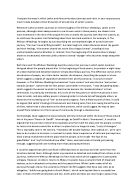Contrastingly, Abse suggests he was previously entirely immersed within the lives of those around him in his poem “Return to Cardiff”. Interestingly, as Cardiff is Abse’s “hometown”, it could be argued that the journey to leave home separates you from both the place and the people, as when he returns he almost sounds like a visitor in a place he is no longer at ease, “a city of strangers”. This is especially clear in the last line, “hesitated, left double footstep, then walked on”, as he can’t bear to be a visitor in his home. In contrast to Larkin, Abse’s experience of visits and journeys here show a deep involvement with the place and the people, as he recalls “the face of my grandfather” and “my first botched love affair” there, whereas Larkin is literally just passing through, suggesting visits are nothing more than passing experiences.
It could be argued that Larkin and Abse’s differing views on journeys and visits come from the intentions behind them. Although Larkin is presented as detached and isolated from others on his journeys, neither the Whitsun Weddings nor Here hold a tone which suggests he is particularly unhappy. However, on Abse’s returns to Wales, his poems have a semantic field of dread and sadness, as he is attached to the place and the people there. Whilst Larkin makes all of his journeys through choice, the undertone of Down the M4 suggests that Abse sees visits as an obligation, “dutiful son going back to South Wales”, which could explain Abse’s unusually low tone. In Down the M4 and Dockery and Son, both Larkin and Abse are returning to a place they spent a significant period of their life. For Larkin, what begins as a visit to presumably his university a more metaphorical journey, as he realises his own isolation and lack of attachment to anywhere or anyone through comparisons with Dockery. However, it could be argued that Larkin was always aware of this, as even at the beginning he is gently mocking his lone “death suited” figure who attempts to reengage with the past, “I try the door of where I used to live” buts finds it “locked” and departs on the train “ignored”. This suggests an awareness of the presentation in these poems of an unnoticed figure simply ‘passing through’, which could be argued to be representative of Larkin’s view on life and death, as expressed in Dockery and Sons “Life is first boredom then fear”. “Was he that withdrawn public schoolboy” again shows Larkin lack of attachment even to people in significant place, as he can barely remember those he spent years with.
Following from this, it could be argued that both Larkin and Abse extent their poems on journeys, namely Dockery and Son and Down the M4, to address the issue of mortality and the wider journey of life. In Dockery and Son, Larkin becomes fixated on the idea of Dockery’s son at college and the differing journeys the two of them took. This is reflected in the image of “joining and parting lines” of the railways, which shows the differences between the two men’s lives. In the third stanza, Larkin presents himself as comfortable within his lifestyle, “to have no so, no wife...seemed quite natural” but he later loses the slightly comic figure who “ate an awful pie at the station” is the tone becomes almost bitter, “For Dockery a son, for me nothing”. Through this poem, Larkin could be argued suggest that visits and returns cause you to be confronted with unwanted realisations, such as he has over the idea of Dockery, which from a psychoanalytic point of view could suggest why he makes so few visits, especially home.
It is clear from Abse’s poetry that he is also aware of the reality that journeys can bring, as in Down the M4 he is “afraid to hear my mother’s news”, as he knows it will be bad. However, unlike Larkin, Abse still makes these visits, which reinforces the idea that he feels obligated to as both poets recognise how unpleasant they can be. In this poem, Abse discusses the journey of death in regards to someone close to him, his mother, and presents the difficulties of knowing someone “won’t keep” as you drive away. However, Larkin addresses the wider issue of the journey towards death, suggesting through the image of the “thick and close sand clouds” that it’s closing in. The last two lines of the poem could be interpreted as suggesting we have no control over the journeys we make in life, “what something hidden from us chose”, however this could merely be an attempt by Larkin to comfort himself.
When writing about journeys, Larkin leaves himself exposed by showing direct involvement without the protection of a persona. He presents different degrees of involvement with the lives of those he passes, as in Here he is merely supposing about the lives of “residents from raw estates” whereas in the Whitsun Weddings, he includes himself in his descriptions, pondering on the directions of their lives will take. It could be argued then that the Whitsun Weddings isn’t simply about his own train journey but about the journeys of the “fresh couples” in their lives. In contrast, Abse is solely focused on his own journey and that of those close to him, suggesting that involvement with people or places can lead to narrow sightedness about the world around, as it simply passes by unnoticed. Finally, as could arguably be expected of Larkin, he leaves all three poems on a note of discomfort about the possibility of death and uncertainty at the end of the journey, suggesting our journeys are beyond our control.








